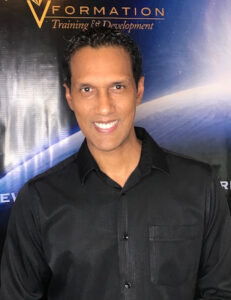
Blog
Your “Voice” Matters!
Imagine that you are in a meeting and a colleague says something that you disagree with. Your gut feeling is telling you that you should say something, because if you don’t, the team may go down the wrong path. However, you are thinking that if you express disagreement, it may affect the relationship. What should you do?
I realize that there are some individuals who are always ready to express themselves but unfortunately, that doesn’t apply to everyone.
Expressing an opinion, especially if it disrupts the status quo or deciding to have a necessary conversation, especially a difficult one, can be challenging for some. However, as Daniel Pink stated,
“Everything good in life— a great business, a great romance, a powerful social movement— begins with a conversation.”
I’m not suggesting that every conversation will have such a life-changing impact, but there’s plenty of evidence out there that demonstrates how conversations possessing the right criteria, whether they start as an opinion or question can change a perspective, alter a course, and sometimes, make all the difference.
Here are 3 factors that allow you to have more control:
1. Choose to express yourself
To what extent do you suppress your needs to avoid conflict? To what extent do you suppress your emotions to protect relationships?
Choosing to express your opinion matters because it is a reflection of your unique perspective, experiences, and values. Everyone brings a different set of experiences and insights to the table, and by sharing your thoughts, you contribute to a richer and more inclusive conversation.
Within the corporate world, we continue to hear about the importance of “Diversity, Equity, and Inclusion (DEI)” globally. Usually, this revolves around demographic diversity. However, my “go to” when I hear about diversity is diversity of thought, which doesn’t contradict demographic diversity but rather accompanies it.
Choosing to express yourself allows others to see and know who you are as an individual, rather than possibly making assumptions based on your group, your role, or your background. Diverse thinking can uncover blind spots, challenge assumptions, and lead to more effective and sustainable solutions.
Will expressing yourself sometimes cause conflict? YES, but it has the potential to drive your personal growth as well as your team’s engagement in CONVERSATIONS and therefore the ability to make decisions and solve problems.
2. Get Your Timing Right
Timing is crucial when deciding to express your options. I will list some self-explanatory things to consider here to increase your impact:
Context: Therefore, make sure the timing aligns with the context and goals of the conversation. Consider what else is happening in the organization or someone’s personal life.
Readiness: Are the participants ready to engage meaningfully? If someone is stressed, distracted, or unprepared, the conversation might be less effective.
Urgency: If the topic requires immediate attention, the timing should reflect that. Otherwise, choose and communicate a time when everyone can focus.
Availability: Find a time when everyone involved can be present without other commitments. This can help avoid interruptions and allow for a more thorough discussion.
Sensitivity: For sensitive topics, ensure there’s enough privacy and that the timing respects the emotional state of the participants.
Choosing the right timing can greatly influence the effectiveness of a conversation when you decide to have it, impacting both the outcome as well as your confidence.
Ok, so you have chosen to express yourself, analyzed if the timing is right so now for the kicker……
3. Align Authenticity and Responsibility
The word “authenticity” has taunted me lately, mostly because of the ambiguous definitions that claim to know what it actually is. Over the years, I have heard; “Be yourself”, “be real”, “be true” as spur of the moment verbal definitions of authenticity…but none of them include; “Don’t be a jerk to others”. The question is, does authenticity involve respect for others?
According to Psychology Today, “individuals considered authentic are those who strive to align their actions with their core values and beliefs with the hope of discovering, and then acting in sync with, their true selves.”
Here is another by Tullio Siragusa: “Authenticity is about living in alignment with your true self. It involves expressing your thoughts, beliefs, and emotions genuinely, without succumbing to societal pressures or the expectations of others.”
Both good definitions in terms of what I have always thought, but our responsibility to others is not mentioned in either of these and should it be?
Let’s look at a scenario:
If someone is being “true to themselves” in their expression to me without being respectful, would I be willing to hear what they have to say? The answer is – NOT LIKELY. Additionally, I may never want to know who they really are or even what they are trying to say. However, can we disagree while still being respectful to each other? YES! Would I be more willing to understand their point of view? YES! This will certainly encourage more of a conversation.
A key point is that authenticity isn’t just about you. An overly rigid commitment to your perspectives, without considering the feelings and views of others, can become a barrier to responsible interaction. Authenticity, closely intertwined with integrity, is essential. It entails being genuine with yourself and others, engaging in conversations with honesty and respect.
According to Brené Brown:
“The problem is that when we don’t care at all what people think and we’re immune to hurt, we’re also ineffective at connecting. Courage is telling our story, not being immune to criticism. Staying vulnerable is a risk we have to take if we want to experience connection.”
“Authenticity is the daily practice of letting go of who we think we’re supposed to be and embracing who we are.”
However, embracing who we are doesn’t mean maintaining relationships with everyone around us. According to my “internet father”, Gabor Maté;
“We associate being ourselves with the threat of being rejected so we shouldn’t give up our authenticity for the sake of attachment to others.”
 Respect others, yes, but expressing ourselves doesn’t mean that others will not be offended at times. You simply don’t have total control over that and in some cases, you will have to leave it at that.
Respect others, yes, but expressing ourselves doesn’t mean that others will not be offended at times. You simply don’t have total control over that and in some cases, you will have to leave it at that.
Final Thoughts
In the journey toward personal and professional growth, it is important to strike a balance between the choice to express yourself and the harmony you seek. Expressing yourself is not just about getting your message across, it is influencing others to listen so that you can be understood. Without your “voice”, valuable insights and perspectives might remain unheard, and progress could stagnate. Ultimately, your “voice” has the power to make a difference, both for yourself and for those around you.

Tony Ragoonanan is the Founder of V-Formation Training & Development. As a Performance Management Specialist and Emotional Intelligence Trainer, he helps individuals and organizations to align people, frameworks and outcomes. Outside of this, it’s all about family, football, and fitness!!
868-681-3492 | tonyr0909@gmail.com




Leave a reply